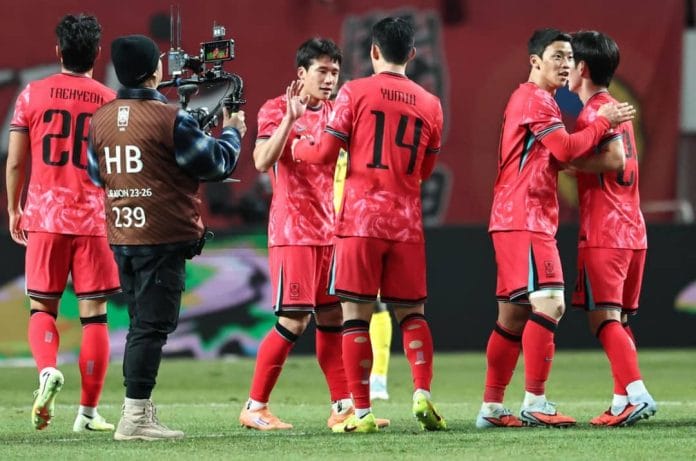South Korea’s men’s football team concluded another year of international fixtures with mixed emotions.
The national side recorded eight wins, three draws, and two losses, a record that superficially appears solid.
Closer examination, however, reveals persistent flaws that could challenge the team in the upcoming 2026 FIFA World Cup.
Under the guidance of coach Hong Myung-bo, South Korea, ranked 22nd in the world, managed victories over Bolivia and Ghana in the final matches of the year.
While the wins were welcome, fans expressed concern over the team’s struggle to dominate lower-ranked opponents convincingly.
The sentiment reflects a broader pattern throughout 2025, in which South Korea frequently underperformed relative to expectations.
The team began the year with 1-1 draws against Oman and Jordan, results that drew criticism from both supporters and the coaching staff.
Hong himself labeled the draw with Oman as “the worst performance” of the qualification phase.
Following those matches, South Korea rebounded with two consecutive victories to secure a World Cup berth in June.
In July, during the East Asian Football Federation E-1 Championship, the team defeated China and Hong Kong but fell short against Japan in the decisive match for the regional title.
A trip to the United States in September brought a strong 2-0 win over the host nation, though a subsequent 2-2 draw with Mexico tempered the optimism.
The victory over the U.S. highlighted South Korea’s defensive solidity and individual brilliance, with captain Son Heung-min contributing both a goal and an assist.
October brought a stark reminder of vulnerabilities, as the team suffered a humiliating 5-0 defeat to Brazil in front of more than 63,000 spectators.
The loss had immediate consequences for fan engagement, with attendance plummeting to just 22,000 for the following match against Paraguay.
Even the final home fixture against Ghana drew only 33,000 fans, a surprisingly low turnout considering the significance of the friendly as preparation for the World Cup.
Hong’s tenure has faced scrutiny for an overreliance on the individual talent of players such as Son and Lee Kang-in, with the team’s offensive strategies often predictable.
The absence of key midfielder Hwang In-beom in the November matches exposed further weaknesses, particularly in linking defense and attack.
Hong acknowledged that the midfield’s limited performance against Ghana hindered the team overall but expressed confidence that Hwang’s return would address many of these issues.
The heavy dependence on a single player underscores a deeper concern regarding the team’s adaptability and depth.
Lee Kang-in, emerging as a vocal leader, emphasized the importance of focusing internally rather than reacting to external criticism.
He highlighted the team’s commitment to mutual support and to improving play in ways that benefit the collective effort.
Veteran Hwang Hee-chan, reflecting on the past year, pointed to the team’s accumulation of victories over strong opponents as a positive takeaway.
He stressed that results matter and that the team had strengthened its confidence and cohesion through shared experiences in 2025.
Looking ahead, South Korea plans additional friendly matches in March 2026 to refine tactics and build momentum before the World Cup kicks off in June.
The team’s preparation remains a delicate balance between addressing weaknesses, maintaining morale, and harnessing the brilliance of its key players.
Discover more from The Maravi Post
Subscribe to get the latest posts sent to your email.



